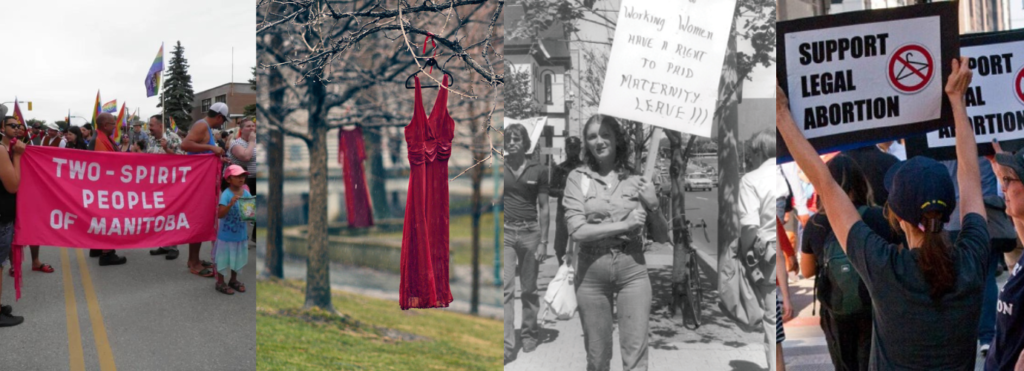
Individuals should be able to exercise control over their bodies, including reproductive decision-making and sexual and reproductive security.
See podcasts and written summaries from our seminar series.
Sexual assault law
The Centre for Human Rights Research is part of a team analyzing why so few criminal sexual assault complaints result in convictions. Impervious to Change is a mixed-methods analysis of criminal sexual assault complaint attrition rates funded by a Social Sciences and Humanities Research Council Insight grant ($268,580, 2019-24) led by Dr. Jane Ursel.
CHRR founder Prof. Karen Busby is a frequent commentator on sexual assault cases before Canadian courts. Every Breath You Take is her analysis of how the courts deal with erotic asphyxiation. She has also been interviewed on such topics as sexual assault civil suits.
Sexual violence at post-secondary institutions
Achieving Fairness: A Guide to Campus Sexual Violence Complaints by Karen Busby and Joanna Birenbaum was published in 2020 by Thomson Reuters.
Administrators involved in any aspect of sexual violence complaints find themselves on a steep learning curve. They quickly realize that complaint-based processes involve a series of decision-making steps, each with its own set of legal issues. Decision makers must determine whether interim measures should be imposed, whether complaints can proceed in tandem with criminal charges, how to balance privacy and demands for transparency, and whether an allegation of sexual violence has been proven. CHRR founder Prof. Karen Busby’s research in this area will increase understanding of the legal rules that apply, aiding administrators, investigators, lawyers, academics, arbitrators, union and student leaders, complainants, and respondents.
Busby is a co-investigator on the McGill-based IMPACTS project to address sexual violence on university campuses across Canada and internationally.
Assisted human reproduction

 Centre for Human Rights Research founder Karen Busby co-edited a special issue of the Canadian Journal of Women and the Law devoted to feminist approaches to assisted human reproduction.
Centre for Human Rights Research founder Karen Busby co-edited a special issue of the Canadian Journal of Women and the Law devoted to feminist approaches to assisted human reproduction.
She was interviewed in 2016 about potential changes to regulations related to assisted human reproduction. Busby is now part of a research team exploring surrogates’ experiences.
Sex work laws
CHRR and the Sex Workers of Winnipeg Action Coalition joined forces to create a pamphlet on Canada’s new (and sometimes confusing) sex work laws. Know the Law and Stay Safe.
Meanwhile, CHRR founder Prof. Karen Busby and Dr. Sarasu Esther Thomas from the National Law School of India University are comparing sex-work-related laws that have seen drastic changes over the last few years in both countries.
Sex work by itself was not a crime in either country, though many activities associated with sex work were, such as street solicitation or sharing accommodation and expenses with another sex worker. There are many similarities between the two countries: sex workers come from socially excluded and vulnerable groups, sexual offences have low conviction rates, and sex workers are still vulnerable to arrest for soliciting and other offences.
In Canada, the law changed in 2013, when the Supreme Court of Canada declared unconstitutional various offences in the Criminal Code of Canada relating to prostitution, on the basis that they violated the Canadian Charter of Rights and Freedoms. The Canadian government was given 12 months to introduce new legislation and passed in 2014 the Protection of Communities and Exploited Persons Act, which amended the Criminal Code’s provisions related to prostitution. The new legislation, based to some extent on the Swedish/Nordic model, criminalizes the transaction of paying for sex for the first time in Canadian history.
In India, the law took a different trajectory with the Criminal Law Amendment Act in 2013 that defined the offence of trafficking to include cases where women had consented, taking away the agency of women in sex work, who are now seen as victims of crime. Some people are also advocating for implementation of the Nordic model in India, without an understanding of how that would impact the rights of sex workers.
The research is funded in part by an Institutional Collaborative Research Grant from the Shastri Indo-Canadian Institute.
Influences on Young Muslim Women
Prof. Karen Busby and Sara Mahboob, a doctoral student at McGill University, interviewed 15 key informants in summer 2014 about their perceptions of family and community pressures placed on young Muslim women in Winnipeg when making important life decisions.
Read the preliminary report or a summary and a related newspaper column.
Fighting for Reproductive Rights and Justice
The overturning of Roe V Wade by the Supreme Court of the United States on June 24, 2022 was shocking and will have long term consequences. It also seems to be just the beginning of a movement to once again legitimate control – through law — over the lives and bodies of women and girls, especially those without the means to travel.
Of course, this is not new. According to international law, reproductive rights means the right to choose the number and spacing of your children. Forced and coerced sterilization of Indigenous women, lack of access to abortions (medical and surgical) outside of urban areas and ongoing systemic racism in the health care system and institutions shows that Canada is no utopia for reproductive rights. We are also well aware that other rights, especially those of the LGBTQ+ community, are coming under the crosshairs. Although the decision took place in US courts, we all know that the ripple effects will be felt across borders, including for those of located north of the 49th parallel.
In an effort to provide context, information and solidarity as we move forward the CHRR hosted an informative, webinar roundtable discussion “Fighting for Reproductive Rights in 2022″. This discussion brought together a variety of scholars and advocates – and those who identify as both – including Karen Sharma, Nahanni Fontaine, Kemelin Nembhard, Dr. Sarah Elvins, and Dr. Lindsay Larios. Watch the recording below.
